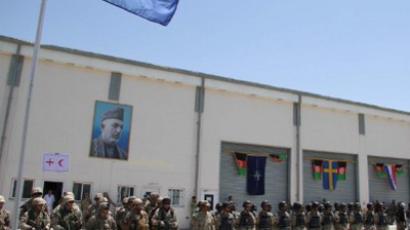‘Russia and US are in for a very hard year’
Russia's political life dominated world headlines in December, with the parliamentary election and its aftermath firmly in the spotlight. But what is the country’s direction in its international policy going to be like?
RT spoke to Aleksey Pushkov, the newly-appointed chairman of the State Duma’s International Affairs Committee, about prospective changes that might be expected in Russia's foreign policy.Speaking of the future shape of the country’s foreign policy, Pushkov particularly pointed out that before anything else is should meet the expectations of the Russian population, and, according to the diplomat, his previous career in television gave him a clear image of what these expectations are.
Russian parliamentary elections and international reaction
The parliamentary elections that took place in Russia on December 4 have invoked heavy criticism from abroad over numerous cases of alleged fraud. The head of the State Duma’s body on international affairs believes that the Russian parliament can simply ignore this reaction.“The response has already been given by President Medvedev in Brussels. He basically stated that the opinion of the European parliament is not important for Russia – Russia is not a member of the European Union,” he told RT. “This is a consolidated position of the Russian parliament [too]. Whatever requirements and requests the opposition parties may have, they would like it to be a domestic procedure. The opposition parties in the parliament, even those who insist that there were violations in the Russian elections, do not support the declaration of the European Parliament and the statement which was made by [the US Secretary of State] Hillary Clinton. They regard it also as a domestic affair.”The diplomat also added that all Russian political parties that are presented in the State Duma have recognized the elections legitimate and attended the first session of the parliament.
US-Russia “reset”
Aleksey Pushkov believes that it is time “to reset the reset”.“The reason is not just [the parliamentary] elections [in Russia] and the American reaction to these elections. I think that there is crisis of a reset policy,” he said. “A number of contradictions have accumulated since [Hillary Clinton offered to press a reset button to Russian Foreign Minister Sergey Lavrov during their meeting in February 2009]. And the biggest contradiction is the US ABM [Anti-Ballistic Missile] system in Europe.”Aleksey Pushkov refers to Dmitry Medvedev’s tough statement on this matter, in which the Russian president mentioned a number of countermeasures that Russia may take if American anti-missile system is placed in Europe without taking Russia’s concerns into account.“I think that this answer was well thought over and was not just a knee-jerk reaction or some kind of impulsive statement,” he pointed out.The diplomat also reminds that Russia has come up with a plan which could provide for a compromise between the two sides on this complicated issue, but this plan has been rejected by NATO.“Recently, we have heard from the [US] State Department that the United States would not allow Russia to have a veto power over US plans of ABM deployment in Europe, that Russia will not be able to change the plan itself and the schedule. Basically, this was a ‘no’…to Medvedev’s offer to resume negotiations,” was his conclusion.
Presidential elections in Russia and USA
Speaking of the forthcoming presidential elections of 2012 in the United States and Russia, Aleksey Pushkov noted that these elections are more likely to have a negative effect on bilateral relations.“[Presidential elections] always have impact on bilateral relations, especially such complicated relations as the relations between Russia and the United States. And my feeling is that these elections will not be an exception, and the effect will be negative,” he said.“[Republicans] are accusing Obama of being too soft on Russia…What kind of reset can we have in these conditions? The administration will have to be sensitive to these attacks, they cannot just, you know, pay no attention, for these are election times,” Pushkov explained. “So I think we are in for a very hard year in Russia-US relations. I think that in Russia too, there is a lot of disappointment with the reset.”“All this state of reset between Moscow and Washington is extremely fragile. So I’m not very optimistic about the prospects of the reset in the electoral year both in the United States and Russia,” the chairman of the International Affairs Committee concluded.













